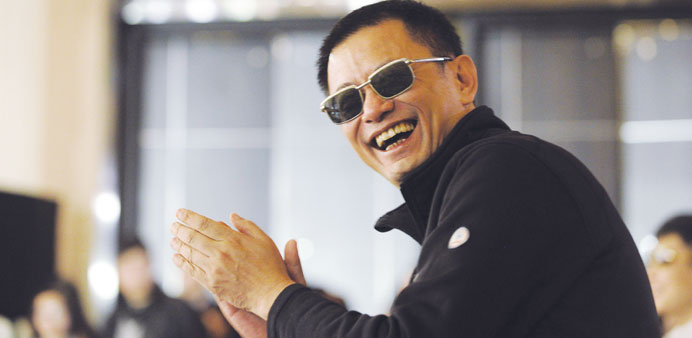Hong Kong director Wong Kar-wai applauds while attending a press conference for his new film “The Grandmaster” ahead of its premiere in Beijing yesterday.
AFP/Beijing
Hong Kong director Wong Kar Wai’s long-awaited martial arts film The Grandmaster was shown in public for the first time in Beijing yesterday, after more than six years in production.
The film spans several decades of Chinese history to tell the story of legendary martial artist Yip Man, who went on to train Bruce Lee, and features lengthy battles between rival kung fu masters.
Wong, 54, is best known for his 2000 slow-burn drama In the Mood for Love.
His new film, packed with Chinese stars including Hong Kong actor Tony Leung and Beijing-born starlet Zhang Ziyi, appears well placed to capture the local audience.
In his first press appearance to promote the film, Wong was also confident that The Grandmaster, which runs for over two hours in its current edit and is steeped in traditional martial arts culture, would be well received abroad.
“There is no such thing as a Western or Eastern audience... the elements of cinema are the same worldwide, although their expression is different,” said Wong, wearing his trademark dark glasses.
The film, set to hit Chinese cinemas on Tuesday, follows its lead character through some of China’s most tumultuous recent history including the Japanese invasion in the 1930s.
It has been delayed several times, amid rumours of extensive reshooting and injured actors, but Wong shrugged off claims that the filming had taken too long.
“It felt like three years of university... we didn’t want filming to end,” he said.
Leung, 50, who plays the eponymous Grandmaster and has also starred in several of Wong’s most acclaimed films, praised his co-star Zhang, 33, for her persistence while filming long fight scenes, which they enacted themselves. “I fought with her a lot of times,” he said. “She was injured several times, and I knew it was tough for her, but it wasn’t possible for me to fight less intensely.”
Shanghai-born Wong, who was raised in Hong Kong, enveloped himself in Chinese martial arts while researching the film’s script, travelling across the country to meet kung fu masters and historians, a process he described as “like discovering a completely new world”.
He also defended the length of his final edit, which contains extended stretches of dialogue between the main characters.
“The film could have lasted four hours, but I deleted a lot of scenes... a one hundred and thirty minute film is normal these days,” he said.
Wong made his international breakthrough in 1994 with Chungking Express and was the first Chinese director to sit on the jury at Cannes.

